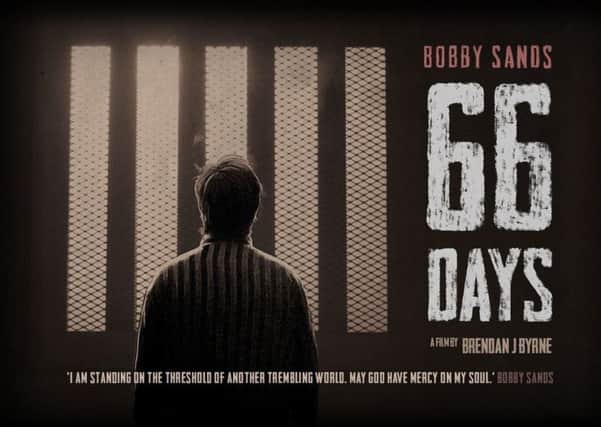William Matchett: Boddy Sands film was well made but a wasted opportunity


The line typifies the Provo cult. It’s all about them.
This is how fundamentalists think. In their eyes, the children of around 60 people murdered by the Provos during the hunger strike are of no consequence.
It is the dilemma the documentary ‘Bobby Sands; 66 Days’ dodged. This is a pity.
Advertisement
Hide AdAdvertisement
Hide Ad

The film is well made. The Irish filmmaker Brendan Byrne is a talent, which deepens my disappointment. I really wanted it to work. From a law and order viewpoint the hunger strike was the Provos reacting to a security initiative called the criminlisation policy that threatened their existence.
It was implemented by the police and took over from internment in 1975. The legal burden of proof was beyond reasonable doubt – as with the rest of the UK – and the non-jury trial was the same as the Irish Republic and some other democracies.
Northern Ireland Secretary of State Roy Mason was an avid supporter. He said that “special category status” for republican and loyalist prisoners was a bad mistake.
Nationalist politician Paddy Devlin was another. He wrote: “The unprecedented barbarity of the Provos’ campaign and their wanton disrespect for life had long removed from me all vestiges of sympathy from them and I was no longer in favour of them having these privileges [special category status]”.
Advertisement
Hide AdAdvertisement
Hide Ad

The Provos hated men like Mason and Devlin and the outlook they held, making it all the more significant in studying Sands. Yet it was hardly mentioned.
I found this strange, as the crux of the film is Sands ardent belief that he was not a terrorist criminal but a political prisoner.
A natural follow-on, then, would have been to explain the criminlisation policy, as this triggered the hunger strike.
Had this been done, it would have begged the question, if murder was not murder, as Sands believed, what was it and who decided?
Advertisement
Hide AdAdvertisement
Hide AdAlso, Sands was sure it was a war and his comrades complained on screen about the privileges this should have warranted but were withheld. They criticised the prison conditions as if they had one with better standards.
What the Provos demanded for themselves they denied to others. They did not take prisoners. It is how they were.
The film introduced a quote by Terence MacSwiney: “It’s not those who inflict the most but those who endure the most, that shall prevail”. MacSwiney was a republican who died on hunger strike in 1920. It was a very different situation.
To apply MacSwiney’s thinking to the Sands film. Who inflicted the most where six people died for every hunger striker? Who endured the most over a prisoner policy?
Advertisement
Hide AdAdvertisement
Hide AdThe final days of Sands are a human tragedy. I know this was a documentary about one man and not a comprehensive analysis of the Troubles.
The politics were well covered, especially the US and Irish Republic aspects. I also thought Sands family was tastefully done and I felt for them.
My issue is that it was a great opportunity wasted to tell the story.
To be fair to Byrne, he did better than most. He tried to be objective. The difficulty here is that it smacked of tokenism. It looked cosmetic.
Advertisement
Hide AdAdvertisement
Hide AdSetting aside the glaring omissions. The pieces that presented the Provos in a bad light were lost in a predictable storyline where the usual suspects – not known for critical self-reflection - got to say pretty much whatever they wanted without serious challenge.
Anything less, I suppose, would have spoiled the script.
After all, no one else counts.
• Dr William Matchett is a senior researcher at the Edward M Kennedy Institute for conflict prevention, Maynooth University, Ireland and author of ‘Secret Victory: The Intelligence War that Beat the IRA’